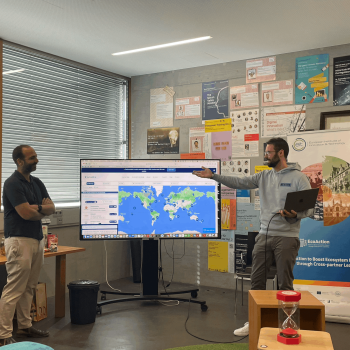In this article, we are not going to discuss the steps you need to take to support your startup ecosystem, because there aren’t any! Instead, there are a variety of potential steps or procedures and you can choose what, if anything, is relevant.
Here we are going to go deep into the philosophy and the basic principles of how to approach this issue, before you start implementing changes and allocating resources.
Stay on top of emerging trends
Startup innovation and entrepreneurship happens even during times of crisis, In fact, many might even come to see this time as a tremendous opportunity to foster new ecosystem development growth. You can access more reports on global and regional economic development as well as our new Coronavirus Innovation Map that shows the best countries fighting the pandemic and facilitating new developments in the pandemic era.

How To Support Your Startup Ecosystem Development
The Good and the Bad
If you play your cards right in time of crisis you can actually save the startup ecosystem in some capacity and allow those that have the most potential to persist. At the same time, your government policy can create a situation where the bad players or those that have to be cleared out are eliminated.
First of all, government and public sector officials are needed a lot more in ecosystem development in times of crisis rather than during routine times. In everyday situations, they help the wave go wherever it does and cannot make that much of a difference bar some exceptional examples of ecosystem development. However, during times of crisis, they have a lot more influence and can make or break startup ecosystem developments to a larger capacity.
We have to remember this is not only a positive thing, your interference can create a legacy of a broken startup ecosystem. It is possible that the things you implement will distort the startup ecosystem and create situations that are hard to recover from due to a problematic intervention.
No textbook solutions
It is then clear, that the decisions and ideas put forward during times of crisis should not be taken lightly. This is not a textbook situation where you can implement steps of tried and tested strategies that will work for all startup ecosystems.
Actually, one of the worst things you can do is to copy-paste from what other countries are doing. Just because something works in one country doesn’t mean it is the best course of action for you and it will most probably bring totally different outcomes. Each startup ecosystem is distinctive in its needs, placement, and potential and thus the steps that you will need to take according to the current changes will also need to be customized to each particular case.
This means you need to tread carefully and acknowledge that there are no clear guidelines. The unknown variables are bigger than the known and you might be doing more damage than good by interfering.
You will be expected to interfere
While your actions need to take into consideration the real possibility of inflicting more damage than good, doing nothing is not an option either.
The public expects you to interfere. The startup ecosystems themselves expect you to interfere and to provide support. It is crucial to show that you care enough about innovation in your country to allocate resources to save startup ecosystem developments if needed.
At the same time, your approach should signal that you are thinking and researching deeply on what the best measures are based on the specific needs of your startup ecosystem and that you are ready to step in and intervene when it is time.
The Hero Doesn’t Save Everyone
One of the main things to take into consideration here is that 90% of startup ecosystems are dead. This is not a Catcher in the Rye moment and you are not going to be able to help all the children from falling off a cliff.
This is also not a situation where you want the survival rate of startup ecosystem developments to be higher during the crisis than during routine times.
Ask the right questions
What changes during a crisis?
The first thing that changes during a crisis is that the startups that are mature and are generating revenue may be hit fatally due to the industry they are in. For example, an amazing startup like Airbnb that has built something in the tourism and hospitality sector will be disproportionately hit during a global pandemic like Covid-19.
While startups are not alone in requesting help and begging for rescue packages, sometimes less than one month after the beginning of the crisis, they must be defended because they didn’t have enough time to build the cushion that we expect the bigger companies to have.
Which are the quality startups?
To start with, it is important to locate high-quality startups in the industry that you believe are going to bounce back. If you are lucky enough to have a startup in a competitive and profitable industry like aviation, tourism, and hospitality, and expect things to recover in some capacity, you don’t want to lose your best technical talent just because of this situation.
What are the investors doing?
This is the second thing to consider and most people, in general, will assume that investors are playing it safe. Whether that is true will need to be determined on an individual case basis.
In general, times of crisis still offer plenty of opportunities, people have money to invest and there is often an exodus from the stock market. In addition, this is a time where we see massive value deflation, which is not necessarily bad for your startup ecosystem development.
There is a little bit of a clearing process here when we talk about investors, that makes a lot of sense. However, we still need to take into account the possibility that investors are much more defensive right now. It could once again be a positive thing. Maybe they are focusing on the things that they should have invested in all along. If that is the case, not interfering with the private market might be advisable.
However, if that is not the case, and investors are much less aggressive now than in other situations, an intervention will be necessary. Starting with an acknowledgment that there is going to be downward valuations and the dilutions are going to be bigger, you have to pick startups that the private sector would have picked anyway. That means that whatever solutions are being implemented, will need to have skin in the game for VCs and someone participating in the rounds. You don’t want to be distributing the money at random.
One option, may be to cover a percentage of an investment. For example, covering 50% of the total investment value while they are receiving more or less the same as before. This way, you are taking the hit together with the startups that are getting highly diluted in order to stay alive and that is okay. It is important to note that Taxpayer money should not necessarily cover those rounds to be matching what they used to be before.
Bootstrap Startups
Regarding bootstrap startups, the possibility of most of them failing is even higher. Specifically, the kinds of bootstrapped startups that by definition do not have a lot of revenue. If your startup ecosystem is not investor driven and not investor motivated, there isn’t much you can do or should do other than identifying the first type of startups we discussed above with high revenue and good potential.
Don’t Save… Leverage
This is one of the most important things you can do to support your startup ecosystem development and it requires a change in mindset above everything else. One of the things we have noticed in Startup Blink is that crisis time is the best time for startup ecosystem growth.
In part, this is due to the fact that a lot more talent is drifting into startups after previously not being able to. Possibly, previous alternatives, in conventional 9-5 jobs, were too good. Whereas now they feel less secure or are already out of reach.
Instead of looking at it as a difficult time, look at it as the time your startup ecosystem can evolve to the next step.
The things that you can accomplish during a period of crisis, massive jumps, product development, and innovation, cannot be done during normal times. The talent pool that has always wanted to dive within the startup ecosystem pool will increase due to a lack of alternatives.
A few ways to support a growth rather than disaster mindset (for ecosystem developers)
- Try to make regulations much easier.
- Make registering a startup easier.
- Consider giving grants to those who are just starting out.
- Organize hackathons
- Recreate online events where people can meet and foster new ideas
- Focus on the opportunity that this period of crisis has created
Summing Up
We urge you to consider this time as a massive opportunity for growth rather than a massive crisis that you have to pick up the pieces from. There is no doubt that you will be tasked and expected to support and interfere. But you can still invest most of your energy into making sure that the leap towards new types of innovation happens.








